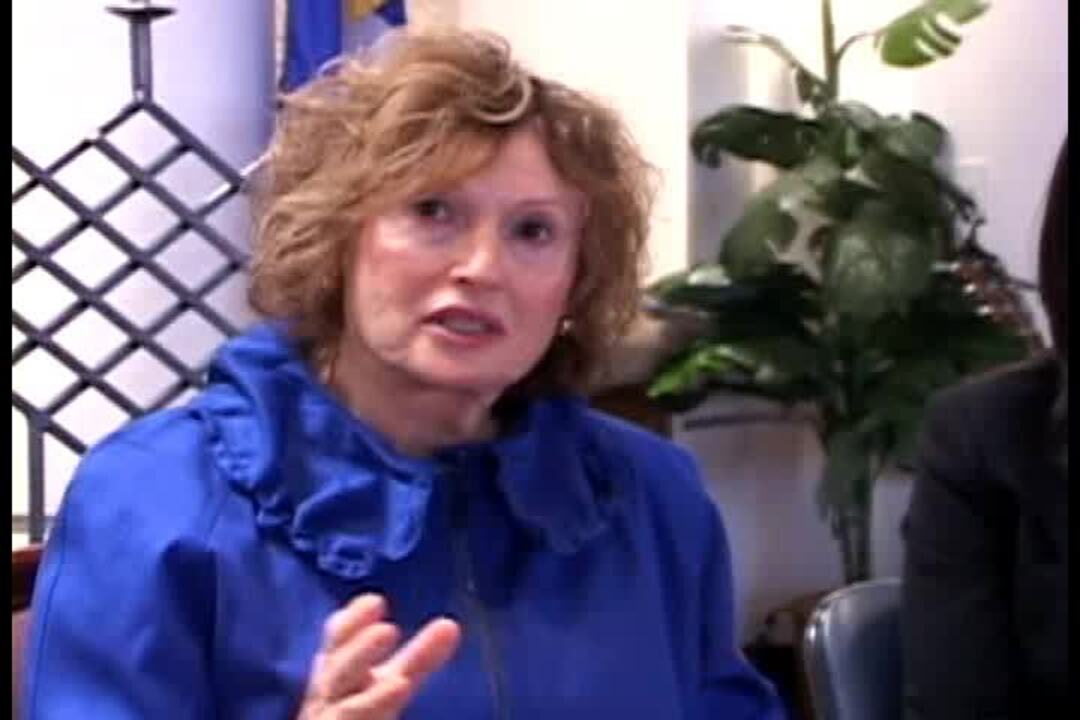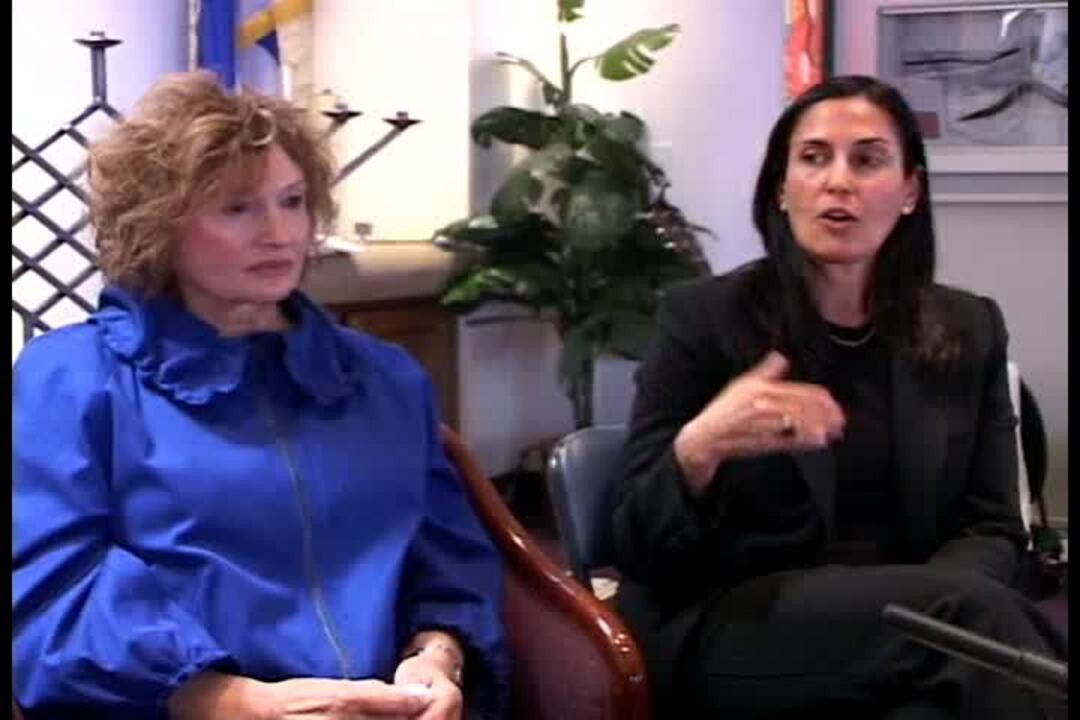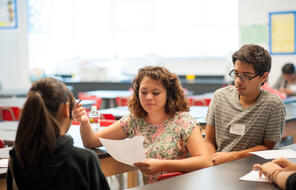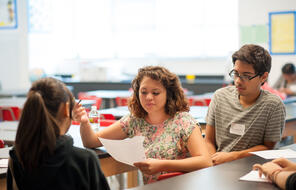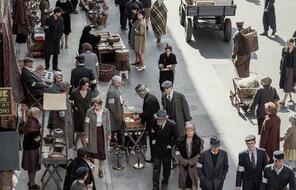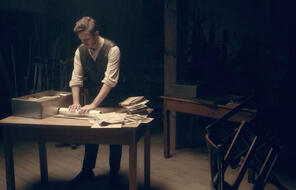Rita Lurie
At a Glance
Language
English — USSubject
- History
- The Holocaust
Rita Lurie was a five year old living in Poland when she and 14 other members of her family went into hiding from the Nazis. What they thought would be a week or two in an attic turned into almost two years. Rita’s daughter, Leslie Gilbert-Lurie, examines the impact of history on her own identity and perspectives, and on her daughter Mikaela in a memoir she co-wrote with her mother called Bending Toward the Sun.
Rita’s Story:
Rita Gamss was five years old when she, her parents Leah and Isaac, her siblings Nachum and Sarah, and 10 other members of her family went into hiding from the Nazis. Surviving on small scraps of food in the cramped attic of a Polish farmer, the family thought they would be there for a week or two. They ended up staying for two years—from the summer of 1942 to mid-1944.
Before the war, Rita enjoyed a happy childhood, surrounded by an extended family. The Gamss lived in a small village in the southeast region of Poland, supported by Isaac’s work as a businessman. Rita enjoyed her mother’s cooking and listening to lively conversations among the adults. Her memories reflect the warmth and beauty of her home.
“Our home was newly built, and another bedroom was still being added for Sarah and me. Until that was completed we shared our parents’ bedroom except on very cold nights, when we slept near a stove in the kitchen. My parents’ bedroom was decorated with a huge gleaming wood armoire, a crib for Nachum, and gorgeous lace curtains hanging from copper rods. A set of exquisite blue ceramic birds sat near a crystal clock upon one of the nightstands.”
At such a young age, Rita was not aware of the mounting hostility and danger that Jews faced throughout Eastern Europe. It was a shock to her when in the summer of 1942 she witnessed German tanks invading the town. Rita watched the adults in the house debate what course of action the family should take. One day, three German soldiers burst into the house and starting throwing things around and then left. A few days later, the family received orders from the Gestapo to report to the train station. Rita’s grandfather, the family patriarch, gathered the family in his kitchen. They all agreed they could not go to the train. Instead the family decided to slip out in the middle of the night and go into hiding. They split into two groups. Rita’s immediate family, and her Aunt Tzivia’s family, which included her husband Libish and four children, would form one of the groups.
Rita’s group hid in the surrounding farms and haystacks for several weeks. A farmer, Stashik Grajolski often brought them news and some food. The adults pleaded with him to hide them in his house, but he resisted because his wife Maria was terrified at the idea. Finally, Stashik had a change of heart, saying his wife was more afraid that he would be caught sneaking around at night.
The attic where the family hid had a ceiling that was only four feet high. The walls and ceiling were wooden planks with cracks in them. Soon after they arrived, four of Isaac Gamss’ brothers joined them in the attic. Rita and the others endured endless hours of silence and freezing cold or unbearable heat, depending on the time of year. They could not move or talk for fear of exposing their hiding place. Rita’s father and uncles snuck out at night to forage for food. Because there was never enough of it, the family sometimes argued over the meager portions they did have. The family had the additional stress of uncertainty, because the farmer’s wife, aware of the great risk her family was taking by hiding Jews, did not want them to stay. She was constantly telling her husband they had to leave.
After a few months, worried about their infant Feigla who was sick and constantly crying, Aunt Tzivia and Uncle Libish decided to leave their daughter on the doorsteps of a church. They hoped a kind person would find her and care for her. They would never see her again. In early 1944, Rita’s little brother Nachum, age five, died. A few months later, Rita clearly remembers a night when her mother lit the Shabbos candles, lay down and died.
The remaining 12 family members survived in the attic until the war ended. One day Stashik Grajolski came up to the attic and announced they were free to go. Weak from malnutrition and lack of exercise the family members stumbled out of the attic, profusely thanked the Grajolskis, and left. They were still somewhat in shock and the children, who had not walked in two years, needed to be carried at first. They found their way home, but did not stay long. Some Poles, called the Armia Krayova, who had helped the Germans during the war, wanted to kill the few remaining Jews who survived. The Gamss were tipped off that if they did not flee their home they would be killed.
The Gamss wandered around Europe, living in displaced persons camps, for the next five years. Eventually, the family was sponsored by a relative living in the U.S. and immigrated, settling first in New York. In this new life, Rita experienced the challenges and opportunities all newcomers face as they start lives in a new place. She married Frank Lurie and had three children, Gwyn, Leslie and David.
Rita described her experiences in a memoir co-written with her daughter, Leslie Gilbert-Lurie. The memoir, Bending Toward the Sun, tells of Rita’s life before, during and after the Holocaust. It also sheds light on the lasting legacies the Holocaust has had on Rita’s children and grandchildren—both in the choices they make, how they see themselves, and how trauma can be transmitted from generation to generation. The memoir also explores Rita’s journey of courage and healing.
Leslie’s Story:
Leslie Gilbert-Lurie grew up in suburban Los Angeles in the 1960s. Although she was raised in a safe and loving environment, she was always aware of a sense of possible danger—a fear she picked up from her mother Rita, who was only five years old when her family went into hiding from the Nazis. But Leslie’s parents also had high hopes for her, and encouraged her to work hard and follow her dreams. And she did, growing up to become an accomplished attorney, network executive, educator and philanthropist.
Over the years, Leslie became increasingly aware that the Holocaust, and her mother’s experience in particular, had left a lasting imprint on her. Leslie grew up knowing some about her mother’s experience—spending two years in a small attic in Poland with eleven other family members who survived, and two who died there, including Rita’s mother. Rita always answered Leslie’s questions about the past honestly, but Rita did not want her children growing up with a sense of hate or fear, so she also avoided the topic.
“My mom was determined to raise us in a positive way. She always wanted us to have things she never had. She wants to get the most out of life. She transmitted that to us, too,” Leslie says.
But Rita also inadvertently transmitted a good deal of her own sadness and fears.
The realization of how trauma can transmit from generations really hit home when Leslie’s daughter Mikaela also displayed that same need to stay close to home and not separate too far from Leslie. Events from the past in part shaped their identities and informed their choices. Leslie explores these legacies in the multi-generational memoir she co-wrote with her mother, called Bending Toward the Sun. Leslie’s story, and that of her mother’s, is also a story of courage and healing and an inspiring reminder of the resilience of the human spirit.
There has been another legacy from the Holocaust that has been a significant influence in Leslie’s life. She is keenly aware that along the way there were upstanders—those who act on behalf of others—whose choices and risks both large and small made it possible for her family to survive. Leslie said in a recent interview with Facing History & Ourselves students,
“We [my siblings and I] were very aware from the beginning that we were born into a fractured world. For us to feel safe and for us to feel like our lives were worth surviving for, we were all very determined to make the world a better place.”
Leslie sees education as a key tool in creating that more humane and safer world. She had been immersed in researching the Holocaust for the book for a number of years when she was asked to teach a class on the Holocaust at Sierra Canyon High School. The superintendent of schools for Los Angeles County introduced her to Facing History & Ourselves, which became an integral part of the popular course she has now taught for three years.
Leslie encourages her students to think about the role of bystanders and upstanders during the Holocaust and in the world today. In her own family’s experience, she describes how there were mostly bystanders all along the way, but everywhere there were also upstanders. One striking example was when the family was told, years after the war, that neighbors in the village knew the family was hiding in the Grajolski family attic, because it was the only house in the winter that did not have snow on the roof.
“I would say it took a whole village of people for my mother’s family to survive. People all along the way chose to be upstanders rather than bystanders. That is a philosophy that was passed down along in my family.”
Leslie tells her students, “You don’t have to be great all the time, and you don’t have to be great at everything to find that moment or two in your life to make a huge difference.”


